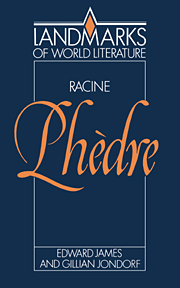1 - The context of Phèdre
Published online by Cambridge University Press: 05 June 2012
Summary
Introduction: versions of a legend
Phèdre represents the culmination of seventeenth-century French classical tragedy and can be fully understood only against the background of seventeenth-century French political, social, and literary history, of which we provide a brief sketch. It should not be supposed, however, that some evolutionary process was at work from which Racine's greatest tragedy emerged by an inherent logic. It is the highly individual work of an original genius, a play organically related to his previous plays, but not their inevitable outcome, and still less that of the creations of his French predecessors who, like himself, were indebted to Seneca and, indirectly at least, to Euripides.
Euripides' Hippolytus (429 BC) is the story of the revenge of Aphrodite, goddess of love, on Hippolytus for neglecting her in favour of Artemis, goddess of chastity. Hippolytus is the son of Theseus and stepson of Phaedra, Theseus' second wife. While Theseus is away, Phaedra falls in love with Hippolytus, and her nurse reveals her feelings to him. He rejects her advances. Phaedra hangs herself, leaving tablets denouncing Hippolytus as her seducer. Theseus banishes Hippolytus and calls upon Poseidon to punish him. A monstrous bull sent from the sea terrifies his horses and he is dragged to his death. Theseus learns belatedly of his misjudgement from Artemis. In a final exchange with his dying son, Theseus is forgiven by him.
- Type
- Chapter
- Information
- Racine: Phèdre , pp. 1 - 18Publisher: Cambridge University PressPrint publication year: 1994



